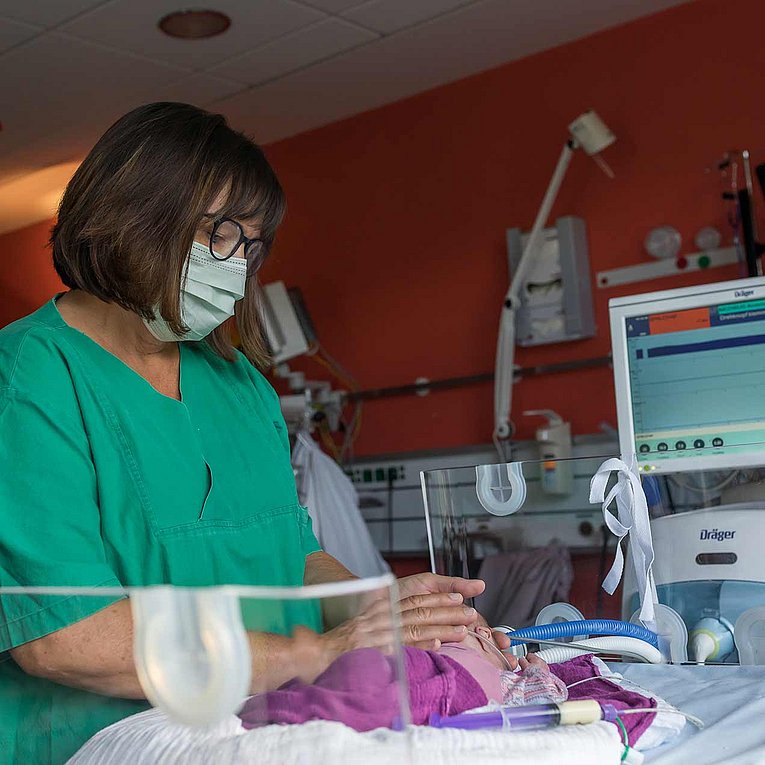As a level 1 perinatal center we provide intensive medical and nursing care to premature infants born before 29 weeks and weighing less than 1,250 grams. In our intensive care unit we also treat and care for newborn infants suffering from any of the following conditions:
- Infant respiratory distress syndrome (IRDS)
- Bronchopulmonary dysplasia (BPD)
- Nectrotizing entercolitis in newborn infants (NEC)
- Meconium aspiration
- Asphyxia
- Pre- and postoperative care of heart defects
- Congenital defects such as gastroschisis, omphalocele, diaphragmatic hernias and esophageal atresia
- Neurological defects such as meningomyelocele

What to expect as a member of the nursing staff on our intensive care ward in the Department of Neonatology
Caring for our patients requires a high degree of perceptiveness to be able to recognize the slightest signals or warning signs and to be able to take adequate action. Professional nursing care for our little patients is always tailored to the specific needs of the individual premature and newborn infants and their parents and is adapted to suit their rhythm. In order to encourage the relationship between parents and children as well as possible from the very beginning, mothers and fathers are involved in caring for the child from an early stage. If necessary, we train them in special nursing techniques. For very small premature infants, we encourage frequent kangaroo care sessions with the parents as soon as possible. Our nursing care takes a developmentally supportive approach and incorporates elements of basal simulation and kinesthetics.
Our expertise
The entire spectrum of cutting-edge medical engineering is used to care for newborn infants on our ward. This includes incubators, heated beds, ventilators, cooling mats and equipment for kidney replacement procedures. For example, the smallest premature babies start off life directly in the incubator with an attached shuttle, in another words a unit with monitoring devices and a ventilator as well as a suction device to reduce the stress of transferring the infant from the initial unit to the transport incubator.
Our central monitoring unit gives us an overview of all beds on our ward, with vital signs being tracked at all times with monitors in the rooms. Our ventilators are also perfectly attuned to the needs of our premature and newborn infants.
We carry out any medical interventions such as ultrasound scans or taking blood samples at the same time as providing nursing care to avoid stress and encourage the infants’ development as a result.
What makes us special
The spectrum of conditions in neonatology is very wide and very good interdisciplinary and interprofessional cooperation is extremely important to us. We encourage regular training in the team in order to ensure that our knowledge is always up to date. In addition, all colleagues have the possibility to take part in continued professional development training in pediatric intensive care and anesthesiology (DKG).
“Work on our intensive care ward is very special, as we are not only responsible for providing emergency care, but also face the challenge of coping again and again with borderline situations. This requires comprehensive nursing and medical knowledge as well as a good technical understanding that is passed on professionally by our mentors and nursing instructors who have undergone additional professional training.”
Susanne Ippisch, ward manager Neonatology 1
Your benefits at UKER
As one of the largest employers in Middle Franconia, we are at the cutting-edge of medicine thanks to our more than 9,800 highly qualified employees in a wide spectrum of different occupations. Our joint success hinges on appreciation of each other’s work and a good work-life balance.
Working at UKER
Outstanding patient care, award-winning research and teaching and cutting-edge medicine is what defines us, Uniklinikum Erlangen We have a clear objective in our sights and are dedicated to do all we can to reach it: carrying out the many and varied tasks of a hospital providing world-class supramaximal medical care.
